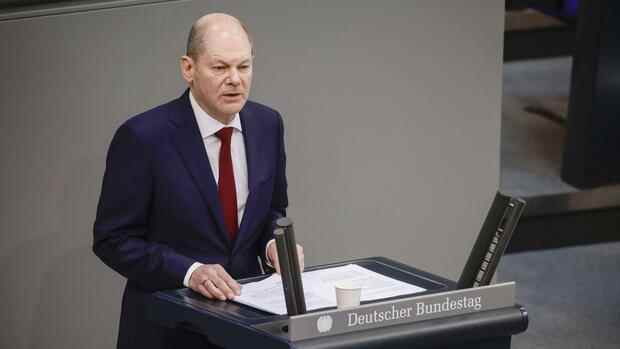Berlin A turning point is a big word – nothing should be the same after this turning point as it was before. What is new may not be valid for eternity, but probably a little longer than the duration of a legislative period, if the term is taken seriously.
This is how Chancellor Olaf Scholz (SPD) was understood when he announced the turning point for the defense budget and the 100 billion euro special fund for the Bundeswehr in February, a few days after the start of the Ukraine war: “From now on we will be year after year invest more than two percent of gross domestic product in our defense,” he said in his government statement in the Bundestag. The NATO states reaffirmed the two percent target in 2014 after the Russian annexation of Crimea.
But there have long been doubts as to whether the traffic light coalition really takes this promise seriously and whether the new financial planning for the Bundeswehr is sustainable. Because so far, neither the special fund has been sealed, nor have the SPD, Greens and FDP made financial provisions for the time when the 100 billion euros have been used up.
The special fund is aimed at quickly procuring missing equipment and closing gaps in ability, emphasizes CDU housekeeper Christian Haase, so it should be planned in the short term. Then Finance Minister Christian Lindner (FDP) would have to ensure that there was enough money available in the regular defense budget to achieve NATO’s two percent target. This must be anchored in the medium-term financial planning when the federal budget for the coming year is drawn up.
Top jobs of the day
Find the best jobs now and
be notified by email.
Read more about the equipment initiative for the Bundeswehr here:
This has not yet happened in the draft for this year’s budget. In the financial plan that extends to 2025, the defense budget is set at around 50 billion euros per year. To get to two percent of economic output, around 75 billion euros would be required.
According to the SPD, the budget will initially be increased with funds from the special fund. “The line is that projects are financed from the special fund when they are ready for decision and procurement, and that the money is then added to the regular budget,” says her defense policy spokesman Wolfgang Hellmich. Whether the two percent target will be reached depends on the years in which large procurement projects are mature.
Sebastian Schäfer, chairman of the Greens in the budget committee, even warns not to “squander” the special fund within four years. This is about large investment projects over a much longer period up to the year 2040, for example the future air combat system FCAS.
The two-percent target should not be the focus, at least in the next few years, emphasizes Schäfer: “It is crucial that we have the capabilities that we have promised our NATO partners.”
The special fund is generally viewed critically by the Greens, after all the party was still campaigning for disarmament instead of rearmament during the federal election campaign. There are calls for an increase in funding for humanitarian aid, development policy and cyber security in return.
At the latest when the special fund is exhausted, the federal government would have to provide more money in the regular defense budget if Scholz does not want to break his word on the two percent target. “Finance Minister Lindner will have to give an answer as to how the at least 25 billion euros should be provided if the debt brake is adhered to,” says CDU housekeeper Haase.
In his government statement, the chancellor made it clear that Germany would also ensure that the two percent target was exceeded at all times, even beyond the special fund, says the chair of the defense committee, Marie-Agnes Strack-Zimmermann (FDP).
The Federal Minister of Finance and the stakeholders involved are working flat out on the necessary financial preparations. “The defense politicians will also keep a watchful eye on this,” says Strack-Zimmermann.
>> Read also: The federal government is planning higher debts because of the Ukraine war – and wants to further relieve the burden on citizens
In the case of her SPD colleague Hellmich, that sounds less like high pressure: “The traffic light coalition can only make specifications for its own term of government, not for eternity,” he says. In plain language: What will become of the two percent target from 2026 is anyone’s guess.
Chancellor Scholz must first see to it that the special fund is launched at all. For the necessary amendment to the Basic Law and the two-thirds majority required for it, he is dependent on the support of the Union, which sets conditions.
He is counting on “that the responsibility for our country and the future of our country” is so great for all parties “that we can also achieve the necessary majority to change the constitution,” said the head of government recently on RBB Inforadio.
However, the opposition is harshly criticizing the chancellor, who says he lacks political leadership. The obligation to vaccinate has shown that, and that is currently reflected in his hesitant attitude when it comes to supplying weapons to Ukraine or investing in the Bundeswehr, says Jens Spahn (CDU), deputy chairman of the Union faction in the Bundestag: “In the meantime, his clear basic pattern has become apparent, It’s procrastinating and slowing down,” criticizes Spahn, who, as Minister of Health in the grand coalition, was still sitting at the cabinet table with Scholz. “It will not be enough to lead our country for four years.”
More on this: No visit to Ukraine, no heavy weapons: Olaf Scholz is coming under more and more pressure
